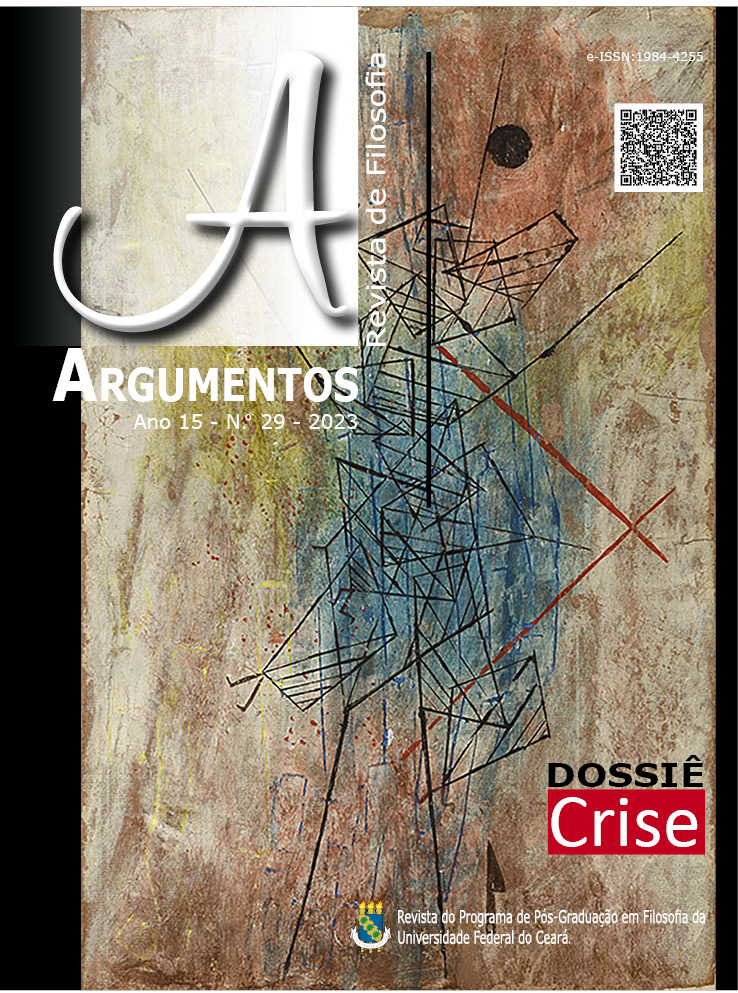Husserl and the reflection of the crisis of Philosophy in the crisis of humanity
DOI:
https://doi.org/10.36517/Argumentos.29.6Keywords:
Crisis. Philosophy. Humanity.Abstract
The present article deals with the problem of the crisis diagnosed by Husserl as an existential crisis of the meaning of Philosophy and its task before the sciences in general. The crisis of the sciences is the result of a deeper and existential crisis, the crisis of Philosophy, which, by losing its universal and guiding character, by doubting its reflective, questioning and rational power (not thought of as in modernity), has the result of being set aside. The positive and technical sciences dominated contemporaneity and assumed the reins of knowledge in the conduct of human life. The consequences of philosophy's skepticism towards itself create all kinds of knowledge, produce scientific aberrations and pseudosciences. The distance from the reflexive, original and universal character of Philosophy to knowledge reflects and contributes to the relapse to barbarism, war and lack of existential orientation of humanity. As a solution, Husserl proposes a renewal in Philosophy, as will be seen in the article in the Kaizo magazine of 1923, and later, he proposes the rebirth of Philosophy in the conference The Crisis of European Humanity and Philosophy of 1935 and also rescues the theme in the work that was his philosophical testament The crisis of European sciences and transcendental phenomenology. An introduction to the phenomenological philosophy of 1936. The discussion of the existential crisis of humanity begins before Husserl's best-known texts on the subject. Philosophy in a larger context of humanity's crisis.
References
ALMEIDA, Rogério Miranda de; LETENSKI, Irineu. Husserl: a crise das ciências o esquecimento do Lebenswelt. Dissertatio, Pelotas, v. 42, 2015, p. 63-80.
BELLO, Angela Ales. Culture and Utopia in the phenomenological perspective. Em: Tymieniecka, Anna Teresa. Analecta Husserliana: The crisis of culture: steps to reopen the phenomenological investigation of man. Holland: D. Reidel Publishing Company, 1976.
BOEHM, Rudolf. Husserl and Nietzsche. Em: BOUBLIL, Élodie; DAIGLE, Christine. Nietzsche and phenomenology: power, life, subjectivity. Indiana: Indiana University Press, 2013.
BOSSET, Philip J. A Common Misunderstanding Concerning Husserl’s Crisis Text. Philosophy and Phenomenological Research. v. 35, n. 1, 1974, p. 20-33.
FINK, Eugen. A filosofia de Nietzsche. Lisboa: Editorial Presença, s.d.
GURWITSCH, Aron. The Last Work of Edmund Husserl. Philosophy and Phenomenological Research, v. 16, 1956, p. 380–399.
HEFFERNAN, George. The Concept of Krisis in Husserl’s The Crisis of the European Sciences and Transcendental Phenomenology. Springer, 2017.
HUSSERL, Edmund. A crise das ciências europeias e a fenomenologia transcendental. Uma introdução à filosofia fenomenológica. Braga: Phainomenon e Centro de Filosofia da Universidade de Lisboa, 2008.
HUSSERL, Edmund. Die Krisis der europäischen Wissenschaften und die transzendentale Phänomenologie: Eine Einleitung in die phänomenologische Philosophie (1936). Husserliana VI. The Hague: Martinus Nijhoff, 1976.
HUSSERL, Edmund. Erste Philosophie (1923-24). Husserliana VII. Netherlands: Martinus Nijhoff, 1956.
HUSSERL, Edmund. Europa: crise e renovação: artigos para a revista Kaizo – a crise da humanidade europeia e a filosofia. Trad. Pedro M. S. Alves e Carlos Aurélio Morujão. Rio de Janeiro: Forense Universitária, 2014.
HUSSERL, Edmund. Investigações Lógicas. Segundo volume, parte 1: Investigações para a fenomenologia e a teoria do conhecimento. Lisboa: Phainomenon, 2007.
KRÍSIS. In: BAILLY, Anatole. Abregé du Dictionnaire Grec-Français. Paris, 1969.
NIETZSCHE, Friedrich. Ecce Homo. Como alguém se torna o que é. São Paulo: Companhia das Letras, 1995.
SARTRE, Jean-Paul. L´être et le neant. Essai d’ontologie phénomenologique. Paris: Gallimard, 1943.
Downloads
Published
Issue
Section
License
Argumentos magazine is licensed under an International Creative Commons Attribution License.
The Magazine uses CC BY inclusion
1) The authors retain the copyright granted to the magazine or the right to initial publication, with the work regularly licensed under the Creative Commons Attribution, which allows the sharing of the work with acknowledgment of authorship and initial publication in this magazine.
2) The authors are authorized to contract additional applicable contracts, for non-exclusive distribution of the version of the work published in this journal (for example, publication in the institutional repository or as a chapter of the book), recognition of authorship and initial publication in this journal.
3) Authors are authorized and encourage to publish and distribute their work online (for example, in institutional repositories or on their personal pages) at any time before or during the editorial process, as they can generate productive changes, as well as increase the impact and reference of published work.




.jpg)










._._3.png)
1.jpg)
._._._.png)
